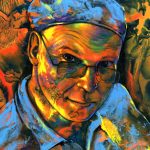THE PEOPLE OF THE ABYSS Liveblog Part 14
 In Chapter 14, Jack London headed out of the city with a cobbler friend to see if they could earn a living wage as seasonal farm workers. They went to the Maidstone district in Kent, southeast of London to pick hops.
In Chapter 14, Jack London headed out of the city with a cobbler friend to see if they could earn a living wage as seasonal farm workers. They went to the Maidstone district in Kent, southeast of London to pick hops.
We’ve had migrant farmer workers in the U.S. just about as long as there have been crops. The work doesn’t pay well today and apparently it didn’t pay well in England in 1902 either. The poor of London needed work though, and tens of thousands made the trek to the fields to earn a paltry sum.
Fourteen years earlier, A few days before she was murdered, Catherine Eddowes, Jack the Ripper’s 4th victim, went with her common law husband, John Kelly, into the Maidstone district to go “hopping.” They worked for three days, but were broke again as soon as they returned to London, all their funds having gone to provide food and shelter.
American president George W. Bush referred to the picking of crops done by migrant farm workers, and much of the other work done by those in the U.S. illegally, as “work that Americans don’t want to do,” as if the pay for such work had nothing to do with it. Most of the migrant workers in the U.S. come from Central America. Most of them cross the border illegally to do the work. Being in the U.S. illegally, they are essentially in hiding, and if they are mistreated, they have no redress through our courts without revealing their illegal status and risking deportation. Such migrant workers seem to endure this situation, and the poverty wages that go along with it, because they still earn better than they can at jobs in their homelands. Along with the agricultural labor, those coming into the U.S. Illegally also work in construction, hospitality, food service, and production. Because they want to stay in the U.S. and remain hidden, the majority of them do very good work. Their existence in the U.S. drives wages down in various sectors of the economy which makes many Americans angry.
I believe it’s wrong that those in the U.S. illegally have become an under class that lacks the rights of the regular citizenry. Some American citizens, those who need scapegoats, many of them bigots, hate those in the U.S. illegally. Yet they should look more closely at their own leaders’ responsibilities in this issue. I think those here illegally deserve our sympathy and help because our government has allowed them to be lured here where they are vulnerable to abuse.
The majority of the leaders in the United States do nothing to end the situation because the existence of such a compliant work force benefits the agricultural concerns and industries that use them. I believe those concerns and industries lobby for nothing to be done, but I also think there are leaders who believe that having a ready scapegoat to gin up anger and fear is useful.
Perhaps I’m just cynical about it.
 In Kent, Jack London and his cobbler friend found that they could not earn a living wage picking hops. With the numbers of poor coming from London to do the work, it was a buyer’s market for those looking to hire pickers, which kept the wages very low. Jack London and his friend worked out their earnings to just over 1 penny per hour. They could not afford both food and shelter on those wages.
In Kent, Jack London and his cobbler friend found that they could not earn a living wage picking hops. With the numbers of poor coming from London to do the work, it was a buyer’s market for those looking to hire pickers, which kept the wages very low. Jack London and his friend worked out their earnings to just over 1 penny per hour. They could not afford both food and shelter on those wages.
—Alan M. Clark
Eugene, Oregon
Get a free ebook copy of The People of the Abyss from Project Gutenburg—available in various formats including Kindle and Epub, : http://www.gutenberg.org/ebooks/1688
Preorder A Brutal Chill in August 
Visit Alan M. Clark online: www.alanmclark.com
About Alan M Clark 
Author and illustrator, Alan M. Clark grew up in Tennessee in a house full of bones and old medical books. His awards include the World Fantasy Award and four Chesley Awards. He is the author of seventeen books, including ten novels, a lavishly illustrated novella, four collections of fiction, and a nonfiction full-color book of his artwork. Mr. Clark’s company, IFD Publishing, has released 44 titles of various editions, including traditional books, both paperback and hardcover, audio books, and ebooks by such authors as F. Paul Wilson, Elizabeth Engstrom, and Jeremy Robert Johnson. Alan M. Clark and his wife, Melody, live in Oregon. www.alanmclark.com
